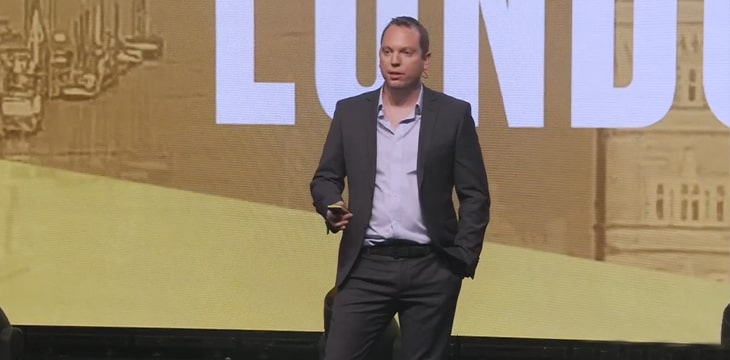James Belding, founder and CEO of Tokenized, appeared as a guest on the Unbounded Live podcast, discussing his route into Bitcoin, his thoughts on the emerging token economy, and the work of Tokenized in bringing the utility of smart contracts to the mainstream.
Belding described Tokenized as a digital transformation of the legal side of finance. He notes that smart contracts act in the same way as ownership certificates, but with the significant efficiencies that come from automation through smart contract functionality.
He said private markets are ripe for disruption—private deals, private debt, and any instruments considered to be private tend to still be paper-based and analogue in the main. With Tokenized, these processes can be made much more efficient, as well as providing greater utility for issuers and other stakeholders.
Bonds, private debt and private equity are in the sights for Tokenized, which Belding said it hopes to streamline. He also believed tokenizing these instruments unlocks secondary markets, and improves liquidity for investors, providing reassurances that instruments can be easily bought and sold, in a way that isn’t currently possible.
On BSV, he said it brings together all the novel qualities of Bitcoin together in the right measures. It focuses on scale, which is essential for real-world use. It is low-cost, which provides the flexibility of handling varied functions. And due to these features, Belding said Bitcoin could replace every payment and settlement network in the world.
Belding said the original incarnation of Bitcoin was the only version he was interested in, until 2017 when he met Dr. Craig Wright. Describing him as a “really smart guy,” he said the BSV enterprise blockchain provides the solutions necessary for delivering on the original vision of Bitcoin. Comparing BSV to other networks, he said this is where most of the best thinkers and developers in Bitcoin are currently coalescing.
Tokenized is also preparing to work with banks to deliver stablecoins. Belding said that rather than considering this a separate entity, a “stablecoin,” Tokenized are developing extensions to the existing tech platforms of banks, effectively allowing them to exploit the benefits of tokens as e-money, an electronic representation of fiat cash.
Looking towards the future, Belding said he sees Bitcoin providing the missing piece for world financial systems. He draws the example of PayPal which is widely used, but remains centralized. With smart contracts and blockchain, he said the trust element is likely to be much higher, bringing on board companies, countries and individuals that might otherwise have been locked out of global financial and payment systems.
Banks as they exist today, in respect of payments, will lose market share. Belding sees their role as shifting towards a greater focus on financial services, rather than trying to compete in the tech arena—this, he said, would be dominated by tech companies, including those working with Bitcoin and blockchain.
On the role of the BSV token in future, he said he envisages this becoming the digital replacement of cash on the blockchain. While he doesn’t rule out the potential for future regulatory difficulties, he said BSV would remain relevant in data and financial transactions.
Belding said there was a need to secure large institutional interest in Tokenized in order for tokens to become compelling in a mainstream sense. A lot of banks are already interested in the technology, both in the U.S. and across Europe, which Belding said makes the value proposition more credible for others onboarding the tech in future.
Wrapping up the discussion, he said that Tokenized and greater tokenization with BSV blockchain would be the future for private instruments and beyond, due in large part to the strength of the underlying platform.
Watch the Unbounded Live podcast episode featuring Tokenized’s James Belding:
Source: Read Full Article
